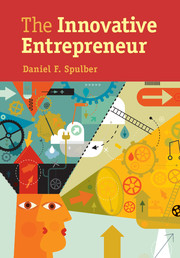Book contents
- Frontmatter
- Contents
- Preface
- Acknowledgments
- 1 Introduction
- 2 Entrepreneurial Motivation
- 3 Innovative Advantage
- 4 Competitive Pressures and Entrepreneurial Incentives to Innovate
- 5 Creative Destruction
- 6 Creative Destruction
- 7 Creative Destruction
- 8 Creative Destruction
- 9 The Wealth of Nations
- 10 Conclusion
- Bibliography
- Index
- References
1 - Introduction
Published online by Cambridge University Press: 05 July 2014
- Frontmatter
- Contents
- Preface
- Acknowledgments
- 1 Introduction
- 2 Entrepreneurial Motivation
- 3 Innovative Advantage
- 4 Competitive Pressures and Entrepreneurial Incentives to Innovate
- 5 Creative Destruction
- 6 Creative Destruction
- 7 Creative Destruction
- 8 Creative Destruction
- 9 The Wealth of Nations
- 10 Conclusion
- Bibliography
- Index
- References
Summary
Much like the popular myth that a bumblebee's flight is aerodynamically impossible, experts often suggest that innovative entrepreneurship is economically impossible. Entrepreneurs must be irrationally optimistic because there are few economic returns to innovative entry. Entrepreneurs cannot innovate effectively because incumbent firms have better complementary assets. Entrepreneurs cannot possibly innovate because only incumbent firms have the necessary size and market power to support innovation. And yet, they fly!
Innovative entrepreneurs add value to the economy through individual initiative, creativity, and flexibility. Innovative entrepreneurs help overcome two types of institutional frictions. First, existing firms may not innovate efficiently because of incumbent inertia resulting from various organizational rigidities. The innovative entrepreneur compensates for incumbent inertia by embodying innovations in new firms.
Second, markets for inventions may not operate efficiently because of transaction costs (search, bargaining, contracting, monitoring), imperfect IP protections, costs of transferring tacit knowledge, and imperfect information about discoveries. The innovative entrepreneur addresses frictions in markets for inventions through own-use of discoveries and adoption of innovative ideas.
This chapter presents a dynamic economic framework that will be applied to study the innovative entrepreneur. The entrepreneurial process has three stages: invention, entrepreneurship, and competitive entry. The dynamic framework emphasizes the interaction between the personal consumption-saving decisions and the business decisions of the individual inventor and entrepreneur. As economic functions change, the individual’s role shifts from inventor to entrepreneur to owner, although there may be different individuals at each stage. The time line of the three-stage entrepreneurial process appears in Figure 1.1.
- Type
- Chapter
- Information
- The Innovative Entrepreneur , pp. 1 - 38Publisher: Cambridge University PressPrint publication year: 2014



